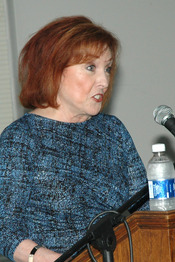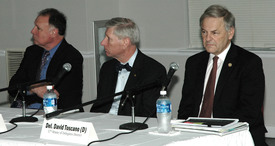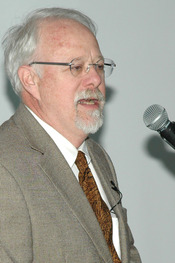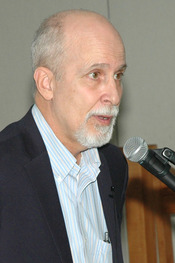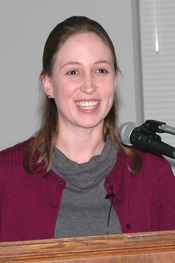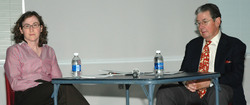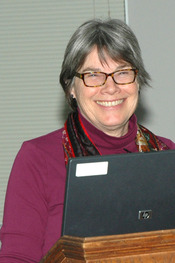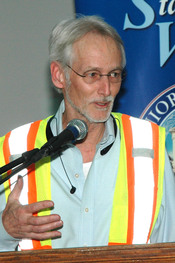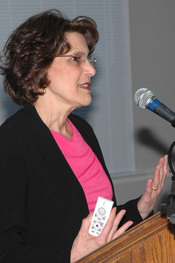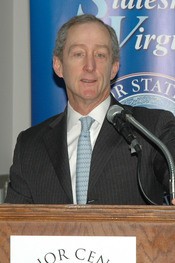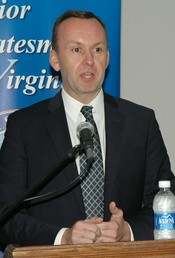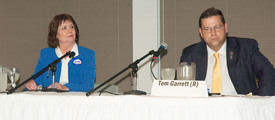
The Senior Statesmen of Virginia has sponsored the 5th Congressional District candidates’ forums for many years. All of the candidates for this year’s August forum were invited: Jane Dittmar (D), Tom Garrett (R), Stephen Harmon (Libertarian), and Yale Landsberg (Independent). Only Jane Dittmar and Tom Garrett agreed to participate in this forum.
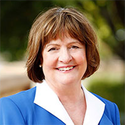 |
Jane Dittmar (D) is the immediate past chair of the Albemarle County Board of Supervisors and former representative of the Scottsville District. Through her position as supervisor, she served on the Governor’s Broadband Advisory Council.
Jane is a certified mediator for both General District and Circuit Courts and has served as court coordinator for the General District, Juvenile and Domestic Relations, and Circuit courts of the City of Charlottesville and the counties of Albemarle, Fluvanna, Greene and Louisa. She is also a principal in the Positive Solutions Group and a business consultant specializing in strategic planning. Jane’s background is business and she has owned and worked with many businesses in the Commonwealth particularly when she served as president of the Charlottesville Regional Chamber of Commerce from 1992-2000. Jane became a Virginian when she was six years old, attending Arlington County Public Schools after her family moved from rural Illinois. She graduated from the University of Virginia where she received a degree in Economics. Since then, Jane attended the UVa Darden School’s Executive Program and Virginia Tech’s Center for Public Administration and Policy. Over the past 40 years, she has lived in Nelson, Fluvanna, and Albemarle Counties, and the City of Charlottesville. Jane resides with her husband, Frank Squillace, in Albemarle County. They have raised six children (Will, Mary, Virginia, Leia, Jed, and Joe), four of whom are in college. |
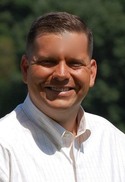 |
Tom Garrett (R) is in his second term as state senator representing the 22nd District. He earned both his Bachelor’s and Law Degrees from the University of Richmond, and began his service to our country with six years in the Army. During that service he honed his leadership skills, had an opportunity to work with great American patriots, and fight for the Constitutional rights we hold dear.
In 2007, Tom entered public service in a new way. That year he challenged and defeated a two-term incumbent for the office of Commonwealth’s Attorney in Louisa. Tom won that election by 17 percent. It was the first time in decades that an incumbent countywide office holder was defeated – and the first Republican countywide candidate to win since Reconstruction. In 2011, Tom was elected as the state senator for the 22nd district following a reshuffling of district borders that saw the 22nd moved eastward and into the 5th, 6th, and 7th Congressional districts. Tom won a 5-way nomination contest and subsequently won a resounding general election contest against an accomplished Democrat opponent, despite being outspent nearly 2-to-1. In the Senate, Tom has focused on expanding liberty, reclaiming our Constitutional rights, fiscal responsibility and restraint, and common sense reductions in the size and scope of government. |
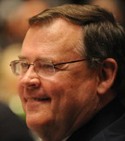 |
Bob Gibson (moderator) is a senior researcher at the Academy for Civic Renewal, a part of the University of Virginia’s Weldon Cooper Center for Public Service. He has served eight years as executive director of the Sorensen Institute for Political Leadership prior to joining the academy on July 1. |
The candidates spoke at the Wednesday August 10, 2016 meeting of the Senior Statesmen of Virginia. The meeting was held at the Senior Center in Charlottesville. Following the presentation, questions were taken from the audience.

